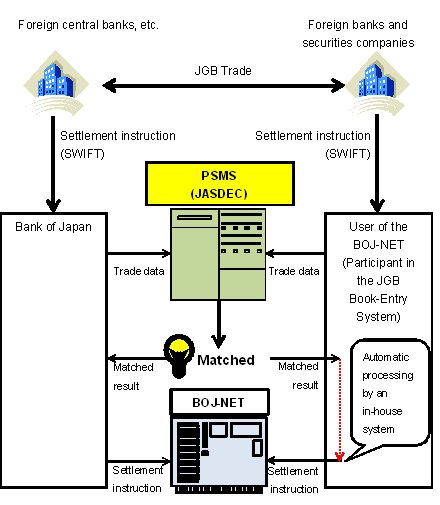New Operational Process for Japanese Government Bond (JGB) Settlement for Foreign Central Banks and International Organizations
September 28, 2017
Bank of Japan
Japan Securities Depository Center, Inc.
The Bank of Japan will revise its operational process for the JGB custody services that it provides to foreign central banks and international organizations, based on deliberations with Japan Securities Depository Center (JASDEC).
1. Use of the Pre-Settlement Matching System (PSMS) and Start of T+2 JGB Settlement
In Japan, a working group led by the Japan Securities Dealers Association (JSDA) is making necessary preparations for shortening the standard settlement cycle of domestic JGB transactions between residents from T+2 (two business days) to T+1 (one business day).1 This shortening will be implemented effective May 1, 2018, for transactions with a trade date falling on or after such date.
Meanwhile, the settlement cycle of cross-border JGB transactions, with or between non-residents, is not within the scope of the initiative for shortening the JGB settlement cycle, given that such transactions usually involve various parties in different time zones. Nevertheless, the shift to a T+1 cycle for domestic transactions may increase the demand for a shorter settlement cycle (T+2 cycle) for cross-border transactions. It is widely considered desirable in the securities industry for market participants to launch initiatives that enable swift T+2 settlement in cross-border transactions and to promote the use of the PSMS of JASDEC by sub-custodians, securities companies, and other financial institutions in Japan.2
On this basis, the Bank will enhance its operational capability to accommodate T+2 JGB settlement for foreign central banks and international organizations, by using the PSMS and revising its operational process along with Japanese market practices to the extent possible.
- It aims to shorten the settlement cycle -- the period from trading to settlement -- for JGB outright transactions that are currently settled on the second day after the trade date to the day following the trade date.
- See "Outline of the Grand Design for Shortening of JGB Settlement Cycle (T+1)," released by the JSDA in November 2014.
2. Future Prospects
The Bank will continue to discuss the details of the new operational process with domestic sub-custodians and securities companies and, on the premise that necessary arrangements will be completed on schedule, the Bank will start T+2 settlement based on the new process from June 2018.
The Bank expects that the new operational process will foster faster and smoother JGB settlement for both the Bank and its counterparties, including domestic sub-custodians and securities companies.
JASDEC has been contributing to the greater efficiency and lower risk of securities settlement in Japan, including that of JGBs and stocks. As part of such contribution, it has been providing the PSMS service since 2001. As of now, market participants use the PSMS for around 60 percent of cross-border JGB transactions; they anticipate broader use of the system with a view to promoting an efficient and standardized settlement process. JASDEC expects that the Bank's revision to its operational process and the initiative to shorten the settlement cycle will further encourage the use of the PSMS, thereby improving non-residents' access to the JGB market and vitalizing the Japanese financial market.
Inquiries
Planning and Coordination Division, Operations Department
![]()
Japan Securities Depository Center, Inc.
Post-Trade Services Department
![]()

